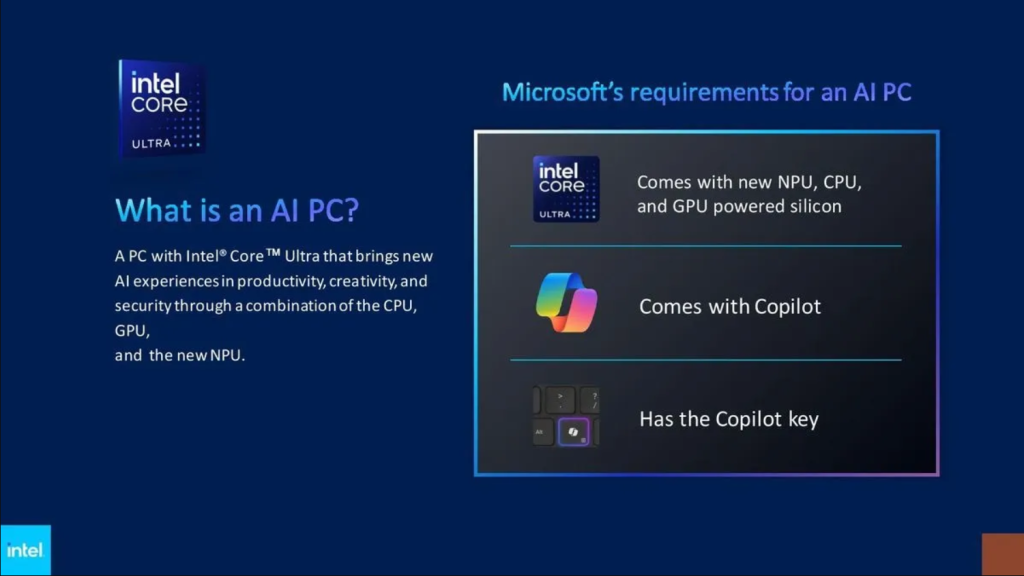Microsoft said 2024 is the year of the AI PC, but what is an AI PC?
Intel and Microsoft have their own definitions of an AI PC
4 min. read
Published on
Read our disclosure page to find out how can you help Windows Report sustain the editorial team Read more

You’ve probably read or heard about the term AI PC, and Microsoft went further to declare 2024 as the year of the AI PC by slapping the Copilot key on a keyboard. It that it? Do you have an AI PC if it has the Copilot key on the keyboard? The short answer is no, but we will get into it.
What is an NPU and do you really need an AI PC? We will try to answer as clearly as possible to all these questions.
What is actually an AI PC?
If you expect a quick and short answer, we don’t really have one because things are more complicated than that.
For instance, Intel’s definition of an AI PC is a computer that has a CPU, a GPU and an NPU inside. At least, that’s the short version. Here’s the long one, from Intel:
An AI PC has a CPU, a GPU and an NPU, each with specific AI acceleration capabilities. An NPU, or neural processing unit, is a specialized accelerator that handles artificial intelligence (AI) and machine learning (ML) tasks right on your PC instead of sending data to be processed in the cloud. The GPU and CPU can also process these workloads, but the NPU is especially good at low-power AI calculations. The AI PC represents a fundamental shift in how our computers operate. It is not a solution for a problem that didn’t exist before. Instead, it promises to be a huge improvement for everyday PC usages.
Intel Newsroom
So, the NPU, or Neural Processing Unit is a hardware element inside a processor that handles the machine learning and deep learning apps on a PC. If you want more information about this, we have a guide on how to figure out if your PC has an NPU.
Slowly but steadily, a lot of apps will run better on NPUs and Microsoft recently announced that their AI services will be able to run locally if you have an AI PC.
Now, switching over to the Redmond giant, they have a more complex definition of an AI PC, made jointly with Intel. According to Microsoft, besides the three elements mentioned by Intel, you also need Copilot (that nowadays comes with Windows) and a Copilot key. So, in their vision, even if your PC has an NPU, you won’t be able to call it an AI PC without the Copilot components.
Of course, Microsoft is pushing for OEMs to include NPUs in their hardware configurations, and that means also including the latest Intel CPUs we’ve spotted recently into the wild or Qualcomm’s X Elite SoCs that come with Hexagon NPUs. The laptops with the latest Qualcomm X Elite CPUs can run Windows and even PC Games using a built-in emulator, but they may also run any other OS or LLM. So, if they are running a Linux distribution and Gemini AI, you won’t be able to call them AI PCs?
Lenovo also announced that their latest AI PCs will have an NPU but they won’t have Copilot or its dedicated key.
The common denominator here is the NPU. Every AI PC will have it or needs to, in order to be called an AI PC. So, for now, we will need to settle for Intel’s definition of an AI PC that must carry a CPU, a GPU, and an NPU. Of course, this may change as this concept is still blurred.
One question remains: do you need an AI PC? It depends on whether or not you want to run AI processes locally. If you want a powerhouse PC to handle the strain of an LLM, you will need an AI PC. If you’re an average user who uses AI bots to manage simple tasks, you don’t need one, at least not yet. The apps you use regularly on your PC will still run just like they did yesterday. You will be able to carry on with your tasks on your computer even without that NPU.
By the way, the featured image for this article was created using DALL-E. So, that’s the AI bot’s vision of an AI PC. Cool, right?
We hope that this article cleared out at least some of your questions, if not all. But if you need more, let’s discuss in the comments section below.









